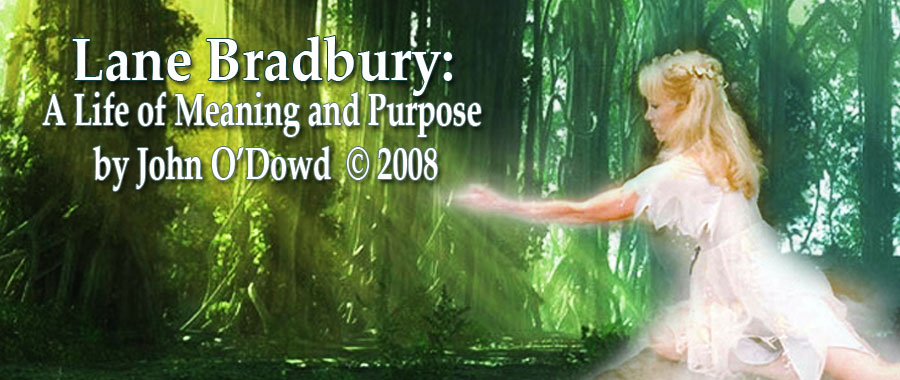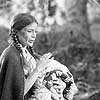Lane Bradbury: A Life of Meaning and Purpose – Page 4
| Last Update: 2008 | |
Page 4 of 6My experience with Gypsy was that it was never that much fun. As time went on I got closer to some of the people but it never was any fun. My agent had gotten me a six month contract for the show which was unheard of at the time because usually they want you for a year. But he had gotten me more money because they were desperate, I guess. After about six months I pulled a muscle and I was out for a week. Then when I was ready to come back they said ‘Oh, why don’t you just take another week’, so I took another week. It was good to have some time off but when I came back, they said ‘We’re firing you because you’ve been absent too long.’ (laughs) I think what happened was they got my understudy to do the part for a lot less money. It was tough to be fired like that but I was tired of it anyway. Still, that’s not the ending you would like… After I got fired from Gypsy I had a brief time when I didn’t have any work and then in late 1961 I auditioned for the Tennessee Williams play, Night of the Iguana. Bette Davis was starring in it and I tried out for the part of Charlotte Goodall—which was a very emotional role—and I got the part. It was really, really hard, though, as the character goes on stage hysterical and comes off even more hysterical—all in the space of three minutes! A lot of times Tennessee Williams’ words help an actor get to where she needs to be but they didn’t in this case…I just had to do it all on my own, eight times a week, for, like, eleven months. Believe me, that’s hard duty and it was extremely draining. I must say, a lot of my experiences on Broadway were not all that great. A lot of people are crazy, you know, and at that point in my life I was a little crazy, too. I think if I did it again, with what I know now and with the life experiences I’ve had, I would know how to counteract some of that craziness, but I didn’t at the time. I mean, I had no clue. Out-of-town with Night of the Iguana was a disaster. Patricia Roe, a co-star in the play, and I were getting all the good reviews for a while, and I’m afraid it caused some whiplash. I remember Paula Prentiss, who was the understudy of Bette Davis (and also the producer’s wife), coming up to me one night outside the theater, screaming, “You are fucking up the whole show! Nobody can hear you.” Which was an odd thing to say since Pat Roe and I were getting really good reviews. But you know, I guess Paula needed somebody to dump on that night, and since she couldn’t dump on Bette Davis, I got it! (laughs) Each night during the play’s initial run in Chicago, I would sit and prepare my lines right next to where I would have to go on stage. I remember one evening Bette Davis walking by me and giving me a very dirty look. Well, the next thing you know, she’s talking to the stage manager who then comes over to tell me that I couldn’t prepare my scenes there anymore and that from then on I would have to go down four flights of stairs to the basement to wait for my cue and then run up just in time to go on stage. The whole situation was very upsetting to me but actually it only helped me. You know, Charlotte Goodall was hysterical and so was Lane Bradbury from this kind of lousy treatment! (laughs) Anyway, Night of the Iguana finally opened on Broadway and we were a big hit. Even though I had a contract to be with the show for a year, near the end of my run I was offered a role in Edward Albee’s play Who’s Afraid of Virginia Woolf?, so I left the show one month early so I could do it. However, since I was still emotionally exhausted from Night of the Iguana I decided to coast a little bit in the first rehearsals for Virginia Woolf, and the producers wound up firing me. They replaced me with Bonnie Bedelia. It was a big disappointment but you know, it was all my own doing. I was on an emotional edge from Night of the Iguana and I just allowed my life to negatively effect my work. That was a hard lesson to learn. It was at The Actor’s Studio that I first met Lou Antonio. In fact, I think my third scene at the Studio was with him. The work was called “Kean” and he played Edmond Kean and I played a young actress who was coming to see him backstage to get his autograph. My character was in love with him and it was a great, fun scene to play.. Lou and I started going out and after a while I moved out of my apartment and into his little red house on Route 9 in West Nyack, New York. My parents were mortified…they thought I was ruining my life! But it felt right to me, you know? I didn’t feel I was doing anything wrong. After another play [Marathon ’33] Lou and I decided to spend a summer in L.A. to see what that was all about. Because of all my work on Broadway I got a part on Mr. Novak, with James Fransiscus. It was a teenage role and from there I went right into a guest part on The Fugitive. I didn’t have a very big part and I remember trying to cram so many different emotions into my scenes that I came across very overblown and theatrical. Back then they would let you watch the dailies as you went along so that you could see your work. You could critique what you had done and you really learned about your mannerisms. Well, I learned that I had a lot of mannerisms! And when I got them all going at once, boy, watch out because it just looked yucky. I absolutely hated my performance on The Fugitive…it was horrible. I did enjoy working with David Janssen, though. I think he had some inner demons he was struggling with but it certainly never effected his work, or our work together. He was a very giving actor and a nice man. Around 1967, I started doing a lot of TV. Iron Horse, I think, was one of the first westerns I did. Dale Robertson was the star. That was a show, unfortunately, that I felt they just wanted to rocket through and finish as quickly as possible. I remember one time we did the first half of a scene where my hair was piled up in a bun and I had to appear from behind a clothesline and then when we came back and did the second half I came out from behind the clothesline and my hair was hanging down! I mean, they didn’t even catch it. That was, you know, it was just one of those things that was fun to do but it didn’t have the feeling of commitment behind the scenes like some of the other shows did.
My only negative memory of the show was that the makeup man was a golfer and I always remember him kind of slapping my makeup on real fast so he could cut out of work early to go play golf. So, I would always have to go back and touch up my makeup a little bit. But the Gunsmoke scripts were wonderful and working on that set with all those fine people was a joy. I loved the character of Merry Florene. There I was getting to ride horses and be in covered wagons and all the stuff I practiced in the woods and on my front lawn when I was a child. I was being given the opportunity to gallop off on horseback with a sack of stolen money and do all kinds of neat things…I just loved it. Alias Smith and Jones, however, was another one of those things that felt like it was just about turning on the camera and letting it roll. It was surface TV but I remember seeing myself on the show later on and thinking, ‘Oh, you are just as surface as they are.’ Here I was, you know, in my own cocky way, putting down everybody else on the set and then when I saw myself I thought, ‘Well, you just cranked it out, too!’
Go to page 5 of 6 |
|
Please leave a comment below. or visit my retired guestbook, to see previous comments.





